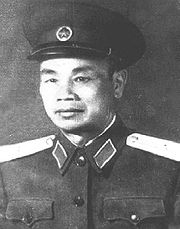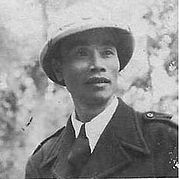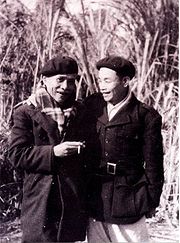
Tran Tu Binh
Encyclopedia

Vietnam
Vietnam – sometimes spelled Viet Nam , officially the Socialist Republic of Vietnam – is the easternmost country on the Indochina Peninsula in Southeast Asia. It is bordered by China to the north, Laos to the northwest, Cambodia to the southwest, and the South China Sea –...
ese revolutionary
Revolutionary
A revolutionary is a person who either actively participates in, or advocates revolution. Also, when used as an adjective, the term revolutionary refers to something that has a major, sudden impact on society or on some aspect of human endeavor.-Definition:...
who later became one of the first generals of the Democratic Republic of Vietnam (1948) and Vietnam’s Ambassador to People's Republic of China (1959–1967).
He was originally named Phạm Văn Phu. Later, during revolutionary time he changed his name into Trần Tử Bình (a name which means "man who can die for peace"). He is most famous for being a leader of Phú Riềng Đỏ labor movement in 1930 and one of the most prominent diplomats of Vietnam, who worked as the Ambassador of Vietnam to China during period 1959-1967.
Honours and Awards
- Gold StarGold StarThe Gold Star medal is a special insignia that identifies recipients of the title "Hero" in the Soviet Union and its communist allies, and several post-Soviet states.-Soviet origin:...
- Ho Chi Minh OrderHo Chi Minh OrderThe Ho Chi Minh Order is a decoration of the Socialist Republic of Vietnam that was first instituted on 6 June 1947. The creator of the order was the president Hồ Chí Minh....
Biography
Binh was born in an all-Catholic village named Tieu Dong, Binh Luc District, Ha Nam Province in the Red River delta of northern Vietnam. His family was poor but the parents managed to scrape together enough money to enroll Tran Tu Binh at a seminary. At school, he was remembered as a brilliant but very restive and steady student. In 1926, because of participating in the public mourning the death of Phan Chu TrinhPhan Chu Trinh
Phan Chu Trinh also known as Phan Châu Trinh was a famous early 20th century Vietnamese nationalist. He also used the alias Tây Hồ. He sought to end France's brutal occupation of Vietnam...
, a prominent Vietnamese scholar-patriot, and mobilizing the students and young people in the neighbourhood to protest against French colonial rule in Vietnam, Tran Tu Binh was expelled from the seminary. His parents and relatives were very much disappointed about it but the young man did not regret. He had a strong belief that what he did was an obligation of any responsible Vietnamese. At that moment, without yet knowing it, Tran Tu Binh joined the ranks of the young patriot intelligentsia, a group destined to play a critical role in modern Vietnamese history.
Early revolutionary years
In 1927 he signed up to labor on MichelinMichelin
Michelin is a tyre manufacturer based in Clermont-Ferrand in the Auvergne région of France. It is one of the two largest tyre manufacturers in the world along with Bridgestone. In addition to the Michelin brand, it also owns the BFGoodrich, Kleber, Riken, Kormoran and Uniroyal tyre brands...
's Phu Rieng rubber plantation in the distant region of southern Vietnam Cochinchina
Cochinchina
Cochinchina is a region encompassing the southern third of Vietnam whose principal city is Saigon. It was a French colony from 1862 to 1954. The later state of South Vietnam was created in 1954 by combining Cochinchina with southern Annam. In Vietnamese, the region is called Nam Bộ...
. This decision was another blow to the family because, even without a school diploma, with his education Tran Tu Binh could have found a respectable job as a village clerk or landlord's agent. Again Tran Tu Binh was determined to break away, to seek adventure, to test his physical and spiritual powers in the totally unfamiliar land. This decision proved crucial for his entire life.
It is during this period working in Phu Rieng plantation that he first met communist revolutionaries and learned about the Marxist-Leninist ideology. In 1929 he joined the Indochina Communist Party. On 3 February 1930 he became the Party Secretary of Phu Rieng and directly led a revolt of more than 5000 workers against the cruel French colonial exploitation at rubber plantation. The movement was repressed by French, Phu Rieng strike leaders were all imprisoned, nonetheless it forced the Michelin company to make certain changes to improve labor's working and living conditions. The Phu Rieng's labor movement 1930, also known as Phu Rieng Do
Phu Rieng Do
Phu Rieng Do is the name of a famous labor movement at Phu Rieng Rubber Plantation in Vietnam in 1930.Phú Riềng was one of about 25 French colonial rubber plantations that stretched along a 300 kilometer band from the South China Sea to the Mekong River in Cambodia...
, has become known as the first big labor movement in the history of Vietnam.
After the Phu Rieng Do incident French colonial
French colonial empires
The French colonial empire was the set of territories outside Europe that were under French rule primarily from the 17th century to the late 1960s. In the 19th and 20th centuries, the colonial empire of France was the second-largest in the world behind the British Empire. The French colonial empire...
government sentenced Tran Tu Binh to 10 years on the infamous Con Son prison island. In Con Dao
Con Dao
The Con Dao Islands are an archipelago of Ba Ria-Vung Tau province, in southeastern Vietnam, and a district of this province.-Description:Situated at about from Vung Tau and from Ho Chi Minh City, the group includes 16 mountainous islands and islets...
he met many communist revolutionary leaders of Vietnam, i.e. Ton Duc Thang, Hoang Quoc Viet, Pham Van Dong
Pham Van Dong
Phạm Văn Đồng was an associate of Ho Chi Minh. He served as prime minister of North Vietnam from 1955 through 1976, and was prime minister of a unified Vietnam from 1976 until he retired in 1987.- Early life :...
, Le Van Luong, Pham Hung, Ha Huy Giap, Tran Xuan Do, Nguyen Van Phat and took advantage of this opportunity to improve his knowledge of communist ideology and nationalism.

August Revolution
Due to the movement by the Popular FrontPopular Front (France)
The Popular Front was an alliance of left-wing movements, including the French Communist Party , the French Section of the Workers' International and the Radical and Socialist Party, during the interwar period...
in 1936 the French colonial government was forced to release some political prisoners from Con Dao. Tran Tu Binh was one of them. After being amnestied from Con Dao he returned home to work as a clerk in Binh Luc District and secretly continued to take part in communist activities against French. From 1936-1940 Tran Tu Binh was appointed as communist party secretary of Binh Luc District and then party secretary of Ha Nam Province.
In 1940 he was elected by the communist party as a member of Northern Region (Tongkin) Committee (Xu Uy Bac Ky) and Commissar of Interregional Network C (including Ha Nam, Nam Đinh, Thai Binh, Ninh Binh Provinces) and network D (Vinh Phuc, Phuc Yen, Phu Tho, Tuyen Quang Provinces) in 1941 and 1943. He became one of the most wanted objects of French Gendarmerie in TongKing during 1940s.
On 24 December 1943 Tran Tu Binh was arrested again in Thai Binh Province and was imprisoned in Ha Nam Prison. In early 1944, after an unsuccessful attempt at jailbreak, he was sent to Hoa Lo Prison (Hanoi
Hanoi
Hanoi , is the capital of Vietnam and the country's second largest city. Its population in 2009 was estimated at 2.6 million for urban districts, 6.5 million for the metropolitan jurisdiction. From 1010 until 1802, it was the most important political centre of Vietnam...
), where he became one of the organizers of a famous collective escape for over 100 political prisoners.
After he returned to the rear, Tran Tu Binh was appointed as a standing member of Xu Uy Bac Ky and was in charge of establishment and development of Hoa-Ninh-Thanh military base for the League for the Independence of Vietnam (Viet Minh
Viet Minh
Việt Minh was a national independence coalition formed at Pac Bo on May 19, 1941. The Việt Minh initially formed to seek independence for Vietnam from the French Empire. When the Japanese occupation began, the Việt Minh opposed Japan with support from the United States and the Republic of China...
).
On August 14, 1945, the Japanese surrendered to the Allies
Allies of World War II
The Allies of World War II were the countries that opposed the Axis powers during the Second World War . Former Axis states contributing to the Allied victory are not considered Allied states...
. The leaders of Viet Minh decided to act promptly to seize the power from the weak and helpless Tran Trong Kim’s pro-Japanese puppet government before the French returned. On 19 August 1945, Tran Tu Binh and Nguyen Khang, the two representatives of Xu Uy Bac Ky remained in Hanoi, directly commanded the general uprising in Hanoi and some neighboring provinces which lead to a start of the successful August Revolution
August Revolution
On August 19, 1945, the Việt Minh under Hồ Chí Minh began the August General Uprising Tổng Khởi Nghĩa, which was soon renamed the August Revolution . Whether or not this series of events should be called a "revolution" is disputable; what is clear is that, from August 19 onwards, demonstrations and...
of 1945.
Military and Political Career

In 1947, he became Deputy Secretary of the General Political Department of Vietnamese People's Army. Late 1947, together with Le Thiet Hung, he successfully led the Vienamese military forces to a military victory at Song Lo front.
On 1 January 1948, Tran Tu Binh was honored to receive a rank of major general and became one of the first 11 generals of the Democratic Republic of Vietnam along with other outstanding military officers like Vo Nguyen Giap
Vo Nguyen Giap
Võ Nguyên Giáp is a retired Vietnamese officer in the Vietnam People’s Army and a politician. He was a principal commander in two wars: the First Indochina War and the Vietnam War...
, Nguyen Son, Le Thiet Hung, Chu Van Tan, Hoang Sam, Hoàng Van Thai, Le Hien Mai, Van Tien Dung, Tran Dai Nghia, Nguyen Binh. In the same year he was appointed as Deputy Chief Inspector of the Vietnamese People's Army.
From 1950-1956 he served as Political Commissar of the Vietnam’s Ground Forces Officer Academy, which at that time was based in China. Since 1951 he was elected to be a representative of the Army Forces to the Third and Forth National Communist Party Congress and member of the National Assembly.

Ho Chi Minh
Hồ Chí Minh , born Nguyễn Sinh Cung and also known as Nguyễn Ái Quốc, was a Vietnamese Marxist-Leninist revolutionary leader who was prime minister and president of the Democratic Republic of Vietnam...
.
In 1959, Tran Tu Binh was appointed as the Ambassador of Vietnam to the People’s Republic of China and Mongolia. He worked as Ambassador in China for two terms (1959–1967), perfectly performed his duty and contributed greatly to the development of cooperative relations between China and Vietnam.
On 11 February 1967, he died at the age 60 due to hypertension in Hanoi. He was honoured to post-humously with Gold Star medal, the most noble medal of the Socialist Republic of Vietnam, befitting his long service to the state and people of Vietnam.
External links
- The historical prison escapehttp://www.nhandan.com.vn/english/life/200805/the.htm, Nhan Dan Newspaper
- "Phú Riềng Đỏ" (The Red Earth - Vietnamese Memoir of Life on a Colonial Rubber Plantationhttp://www.selectbooks.com.sg/getTitle.cfm?SBNum=7057, Memoire of general Tran Tu Binh (1965) , translated into English and published by Ohio University Press, 1985.
- August Revolution: an inevitable path leading to the Nation-State http://www.nhandan.com.vn/english/news/010905/au.htm
- General, diplomat Tran Tu Binh gets posthumous Gold Star, Vietnamnews http://vietnamnews.vnagency.com.vn/showarticle.php?num=02POL150108

